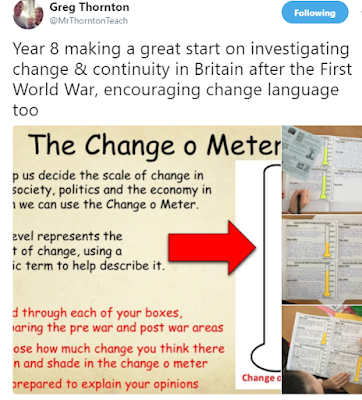Noticing a remarkable difference (of confidence, structure and poise) between some of our students' presentations skills, I decided to dedicate my end of term lessons on developing our students' speaking and listening skills. Naturally, I couldn't help but add a Literature revision element to their lessons with respect to the number of quotes and set texts that they're expected to know very well. As a result, you'll find below a selection of some of the resources I developed with these objectives in mind.
Please click on the image in order to download the resources for yourselves. I would be grateful if you could tweet how your students have responded to these materials in future lessons (@3dimension1) in the new academic year.
The start of the lesson involved getting students to make a series of random links connected to current affairs.
Then links between characters from the same Literature set text.
I decided to get our students thinking about links between different set texts so that they could get an understanding of overlapping themes to help them with their revision.
Students were given the choice to write their speech (with the support of the template below) or to improvise their speech.
All in all, I can see how this strategy can be easily adapted to promote students' higher level thinking skills across all departments with the aim of simultaneously developing their oracy skills.
Please find the link to these resources here.
Featured post
AQA English Language: Speaking and Listening PLCs
Pass Merit Distinction These three main stages in the Speaking and Listening marking criteria are quite different. As a result, I'v...
Saturday 21 July 2018
Tuesday 6 March 2018
Change-O-Meter and the concept of structure in English Literature and Language
Thanks to @mrthorntonteach's Change-O-Meter idea on Twitter, my students are effectively engaging with structure in Literature texts. I've adapted his original idea (see below) for AQA Literature Section A Papers 1 and 2. I've added extracts for comparison for earlier on and later on in each set text and the students are responding to it really well. I will be uploading their responses later on today.
Here is an example for An Inspector Calls:
You can download a copy of the sheet for yourself from here: click here
I've also created one for Macbeth here.
I can't wait to create some Change-O-Meters for Language Papers 1 and 2 too.
Thank you, Greg!
Thursday 8 February 2018
Memory retrieval Power and Conflict poetry tasks
Memory retrieval Power and Conflict poetry tasks
Currently, our KS4 students are revising their Power and Conflict poems and I hope this memory game will improve their recall of quotes.
Each image represents a short quote from one of our Anthology of poems. I've chosen to focus on three quotes from four poems with the deliberate intention of using the same images (with a variety of memory tasks) at the start of every lesson for a week. Our students love it!
Please find lesson 2's starter here. This time the images have been organised in columns with three poems from the same poem.
Here's lesson 3's memory starter:
Here's lesson 4's memory starter. This starter involves PowerPoint animations so that columns 1 appears independently first and then slides 2 and 3 and presented afterwards together.
All in all, I will continue to use this strategy for Power and Conflict quotes as well as Literature set text quotes.
Sunday 21 January 2018
Multiple choice questions and revision
I read @missdcox's blog on providing students with an opportunity to create their own regular multiple choice questions as homework for RS. As a result, I've adapted this idea for English.
First stage is modelling to students what a multiple choice English Literature/Language homework piece could look like. I will then set my students with the task of creating their own multiple choice questions as part of their revision of English Language/Literature skills.
I will be developing Language Question 4 multiple questions for my students in line with @missdcox's aim at getting our students to evaluate their arguments too.
Thank you @missdcox for this strategy!
Click on the above image to download a copy of this resource.
Sunday 14 January 2018
Formative Feedback - comparative poetry essay
Redrafting
It's an essential skill for our students to develop in order to consider whether they've actually met their feedback target. Using the Personal Learning Checklist, students identify what they've forgotten (or didn't know) to add to their original comparative poetry essay. Students then attempt to redraft it with this feedback in mind. However, their redraft is not the be all and end all. They have to identify how their redraft demonstrates that they have met (or have not met) their feedback target.
Findings?Several students were shocked at how they didn't manage to meet their feedback target despite attempting to do so: a quick one to one conversation with a buddy (3b4me) gave them the courage to try again.
Some students identified that even though they had met their new target, they had forgotten to demonstrate other targets as well (AO2 for instance). As a result, they recognised that they were expected to redraft again! Cementing into their minds that mistakes (failure) is the way forward as long as we learn from them, I wanted to create a mistake friendly zone. I was very much inspired by their resilience.
Changes? I will give far more space for the redrafting section (given the number of re-drafts they ended up writing). I will also add a teacher's comment section for an overall RAG rate with respect to student effort and student progress.
Link to my Formative Feedback comparative poetry and unseen poem sheets can be found here: http://bit.ly/2mvfZHP
Subscribe to:
Posts (Atom)













